A Defense Engineer’s Search for an Alternative to War
Open Book Editions, a Berrett-Koehler Partner, 2012
By Russell Faure-Brac
When I quit my defense job in protest of the Vietnam War, I had only a general notion that an alternative to war was possible. The events of 9/11 inspired me to revisit the subject. I now believe that while it won’t be easy, world peace, carefully defined, is possible and the US can lead the world towards it. Here’s why.
Peace Is Possible
We live in an unprecedented time of rapid change in our social and economic structure. World population is increasing exponentially; the age of cheap, available oil is over; climate change is altering the face of the Earth; and the global economy is unstable and could collapse at any time. All of this has implications for peace, as military solutions of the past won’t work in the future.
There is a Path to Get There
To move in the direction of peace, we need to fundamentally change our national security policy. The new strategy I envision is based on three Peace Principles that don’t involve just tinkering around the edges of our military system. It’s about rethinking America’s role in the world and implementing new policies based on three peace principles rooted in nonviolence, peaceful warriorship and the ethics of permaculture:
Peace Principle #1 – Commit to the Well-being of the Entire World
Peace Principle #2 – Protect Everyone, Even Our Adversaries
Peace Principle #3: Use Moral Rather Than Physical Force
Nine programs would implement these principles. They need to be phased in over time and they need to work in coordination with one another – one program alone isn’t sufficient to change our military posture or to convince others that we have. There are two programs of greatest importance.
Implementation of a Global Marshall Plan (GMP) – Social and military theories say that if other societies are better off, they will be less of a threat to us. So why not initiate a GMP to end poverty, patterned after the post WWII plan where we gave billions of dollars to rebuild the shattered economies of Europe. The program had dramatic effects, helping establish a stronger and more stable post-war world. A GMP would be much less expensive than war and would undercut the rationale for terrorism.
Conversion of the Defense Industry – Stopping the production of weaponry would throw millions of Americans out of work and create havoc with investors’ portfolios. Fortunately this can be prevented by using subsidies and by “steering the work” to former defense contractors, allowing them to retool for domestic production. We accomplished a massive conversion from peacetime to wartime production in WWII and we can do it again, just in the opposite direction.
You Can Help Make It Happen
The force for change is much more likely to come from the bottom up rather from the top down – there will not be a President Gandhi. The process will be messy and things will probably have to get worse before they can get better. But ultimately change for peace will come from the amazing ability of the American people to self-correct and chart a new course for the future.








